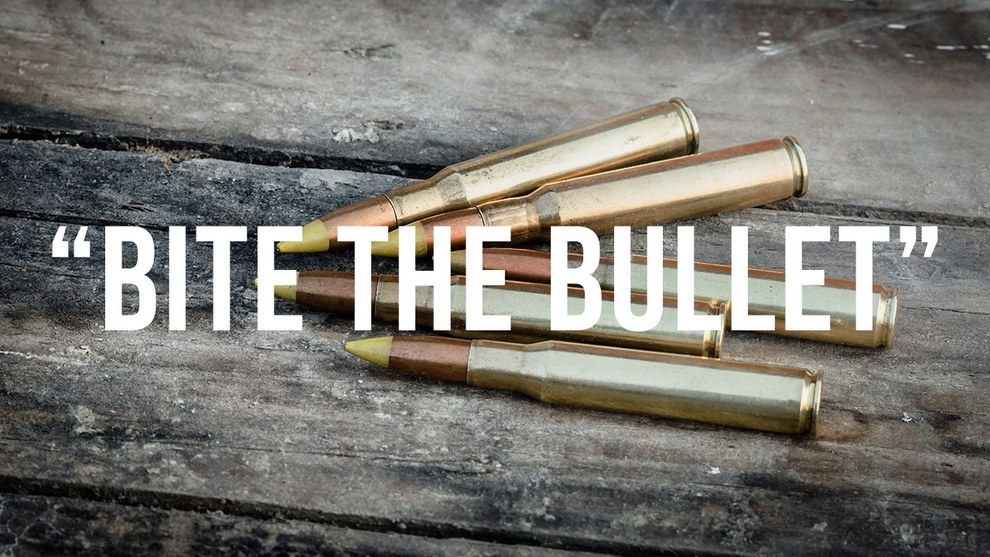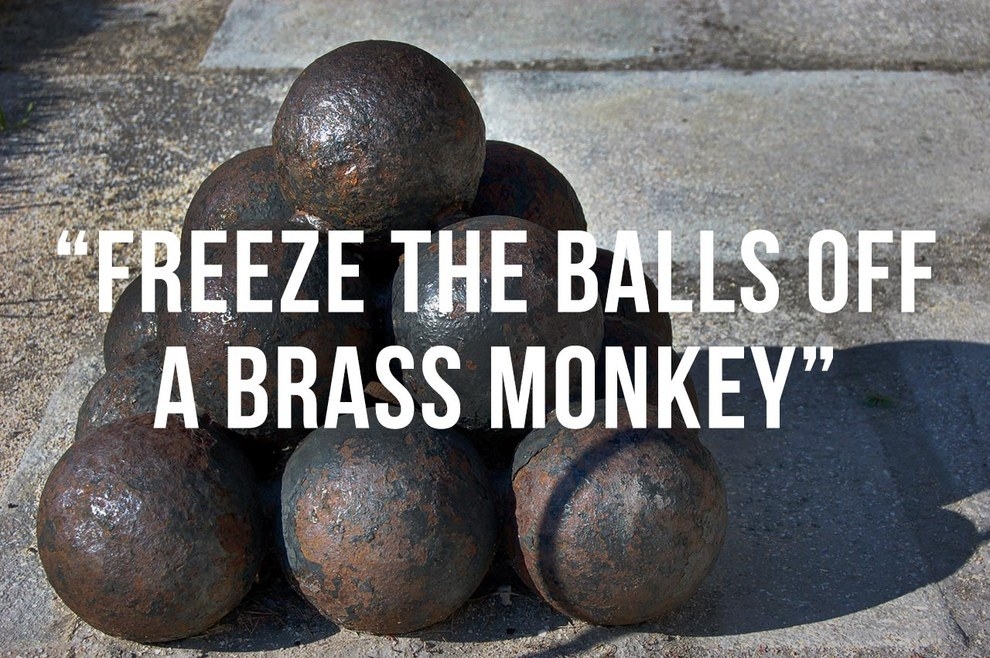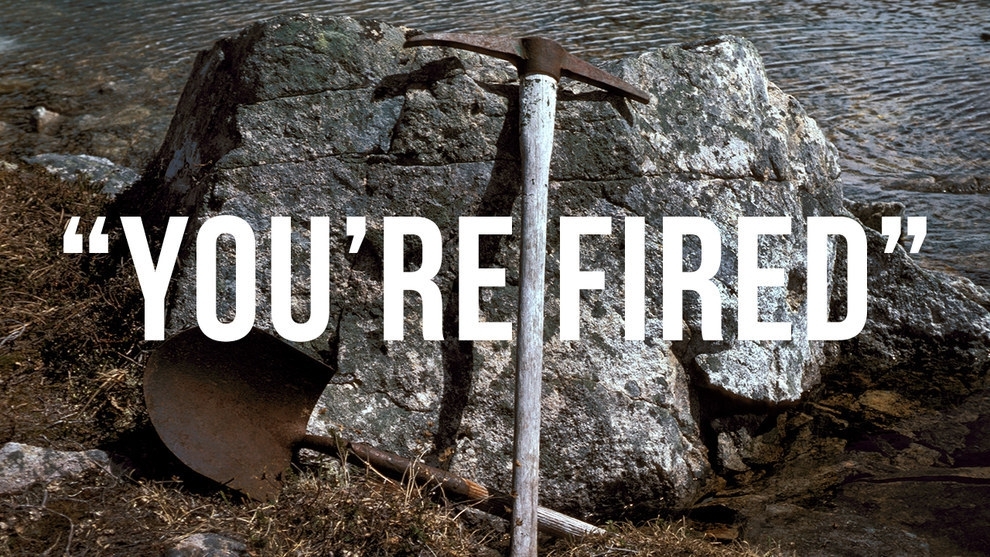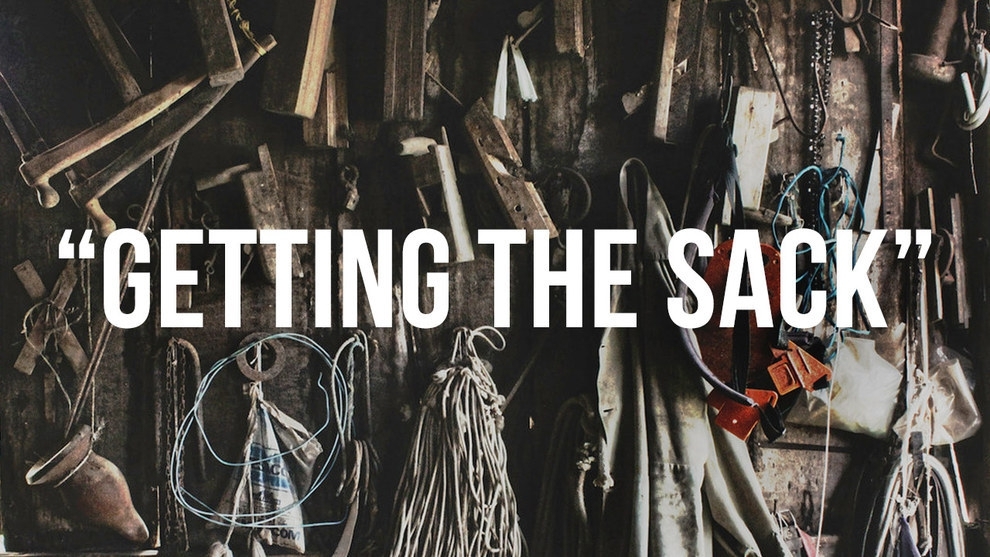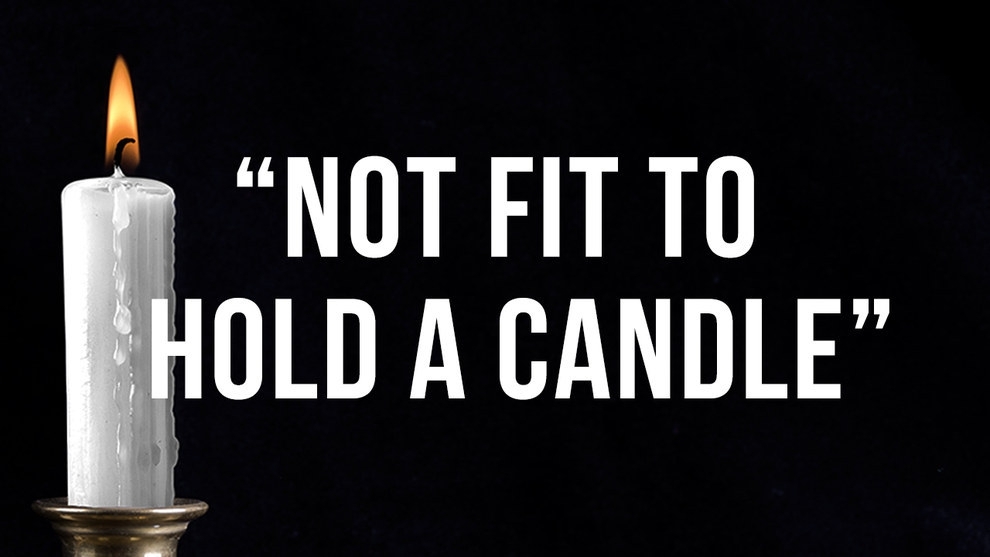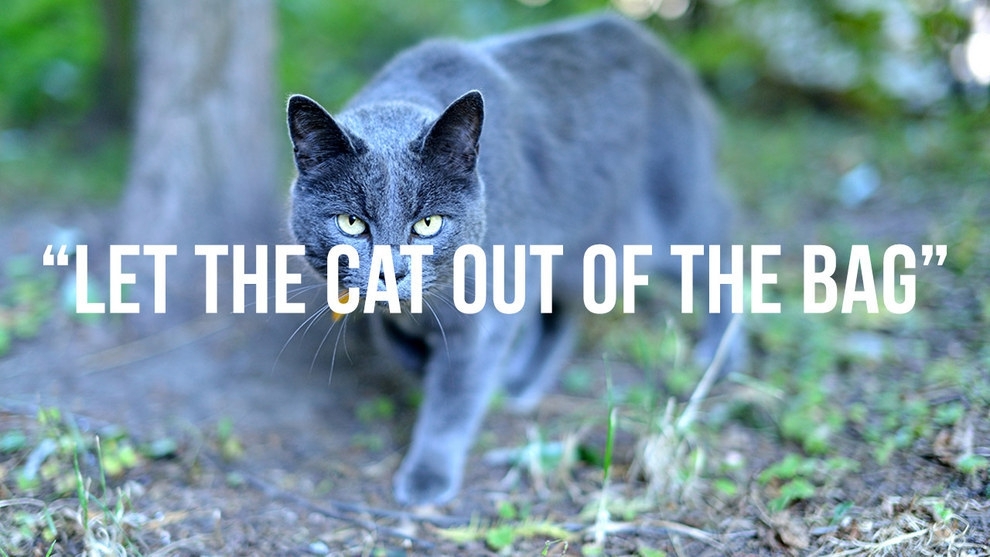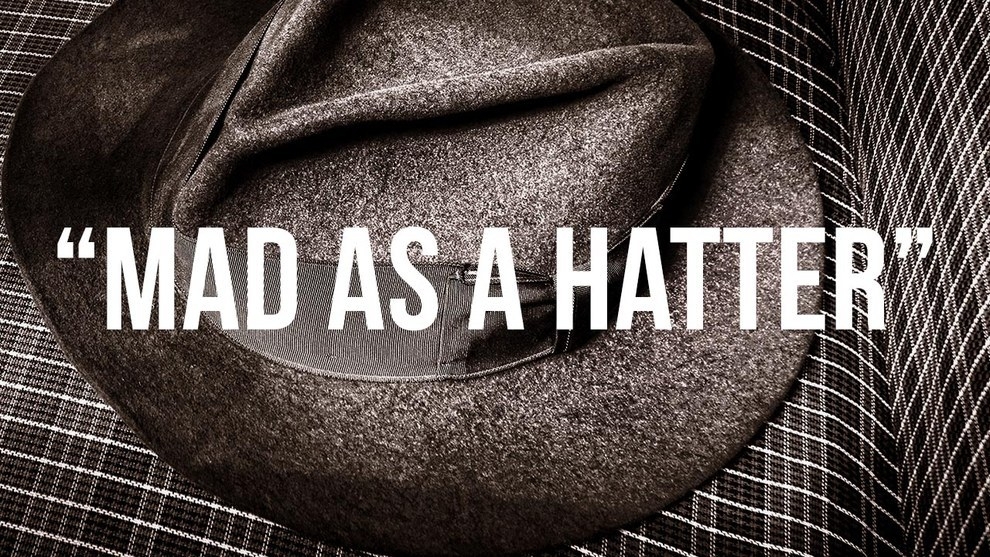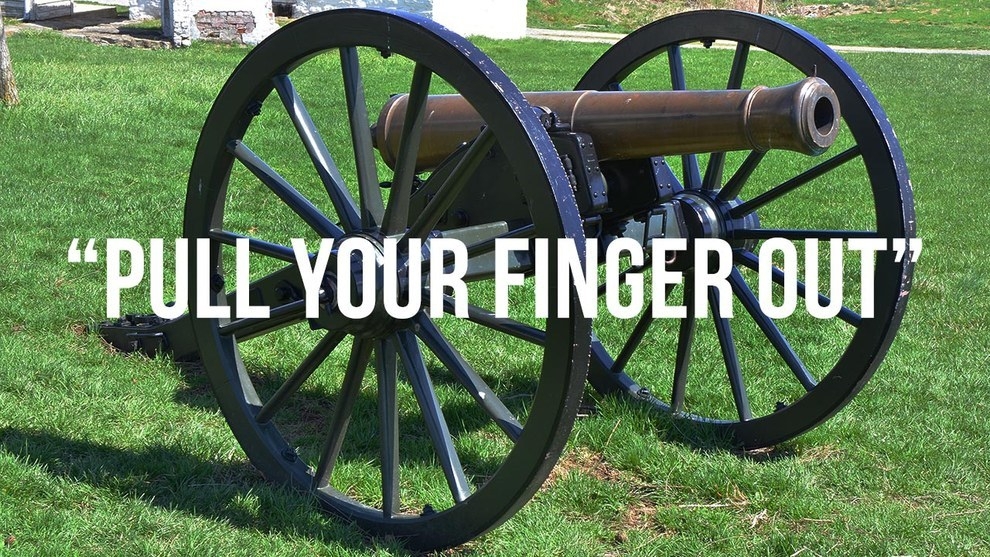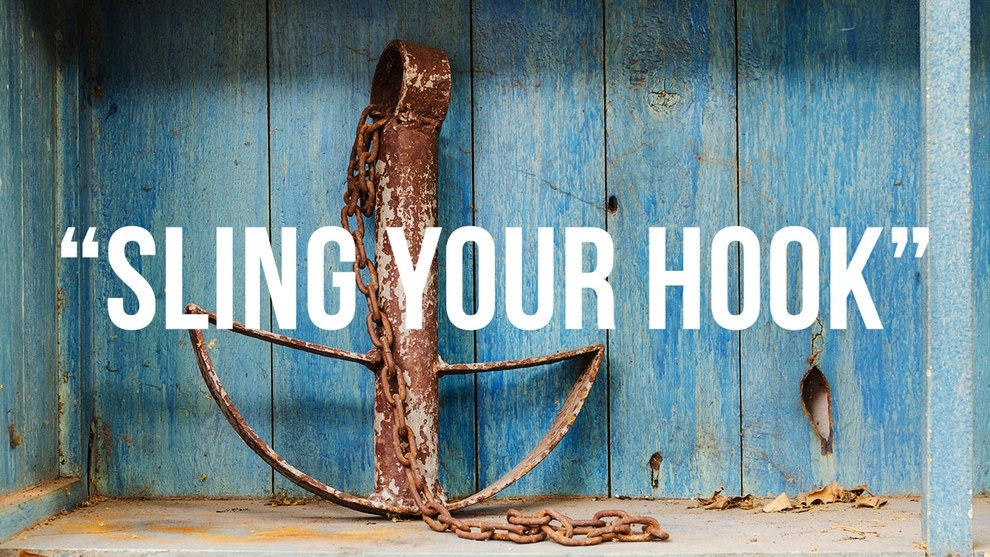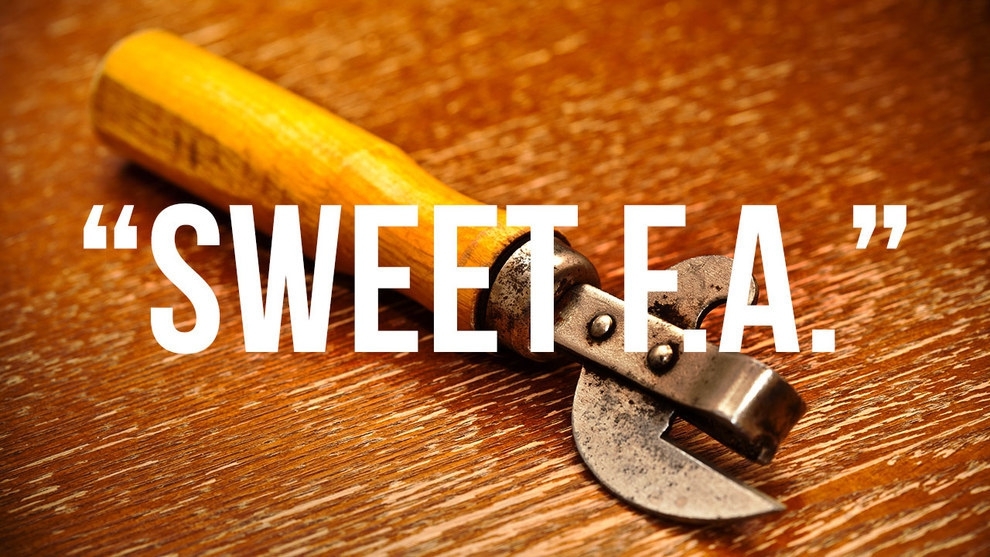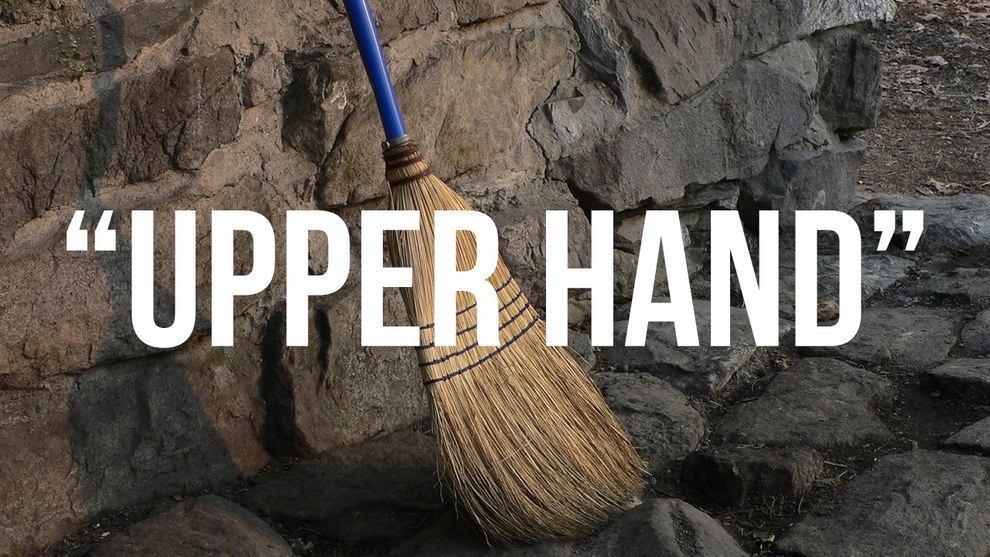0
36
Etymology, my dear Watson.
Meaning back to the beginning, the phrase originated in the 1930s when the first radio broadcasts of football matches were made by the BBC.
To help listeners keep track of the game, The Radio Times devised a numbered grid system which they published in the magazine, enabling commentators to indicate to listeners exactly where the ball was on the pitch.
“Square One” was the goalkeeper’s area, and whenever the ball was passed back to him, play was referred to as being ‘back to square one’.
To help listeners keep track of the game, The Radio Times devised a numbered grid system which they published in the magazine, enabling commentators to indicate to listeners exactly where the ball was on the pitch.
“Square One” was the goalkeeper’s area, and whenever the ball was passed back to him, play was referred to as being ‘back to square one’.
Meaning to carry out a task against the doer’s wishes, or getting on with something that ‘has to be done’, this phrase has its origins in the British Empire during the Indian Mutiny of 1857.
Bullets of the time used grease made of either cow or pork fat to hold the missile in the cartridge. Before they could be fired, the two parts had to be bitten apart and the base filled with gunpowder.
In times of battle, low-ranking Hindu soldiers - to whom cows are sacred animals - were often tasked with separating the cartridges, forcing them, against their wishes, to ‘bite the bullet’.
Bullets of the time used grease made of either cow or pork fat to hold the missile in the cartridge. Before they could be fired, the two parts had to be bitten apart and the base filled with gunpowder.
In times of battle, low-ranking Hindu soldiers - to whom cows are sacred animals - were often tasked with separating the cartridges, forcing them, against their wishes, to ‘bite the bullet’.
Meaning to demand money by threats, usually involving violence or the exposing of secrets, the phrase originated in the Scottish Highlands in the 1600s.
The ‘mail’ in blackmail is from the old Scottish word for rent, usually spelled either ‘maill’ or ‘male’. In those days rent was paid in silver coins - known as ‘white money’ or ‘white maill’.
When Highland clan chiefs began a protection racket, threatening farmers with violence if they didn’t pay, this additional rent became known as ‘black money’. As such ‘blackmaill’ was used to describe the practice of obtaining money by threat of violence.
During the 1900s, when criminals first began demanding money not to divulge a person’s secrets, the word ‘blackmail’ was adopted to describe this.
The ‘mail’ in blackmail is from the old Scottish word for rent, usually spelled either ‘maill’ or ‘male’. In those days rent was paid in silver coins - known as ‘white money’ or ‘white maill’.
When Highland clan chiefs began a protection racket, threatening farmers with violence if they didn’t pay, this additional rent became known as ‘black money’. As such ‘blackmaill’ was used to describe the practice of obtaining money by threat of violence.
During the 1900s, when criminals first began demanding money not to divulge a person’s secrets, the word ‘blackmail’ was adopted to describe this.
Often used as a threat, “there will be Dickens to pay” is not actually related to 19th-century author Charles Dickens, as popular belief would have it.
As long ago as the 16th century the word ‘Devil’ was, in fact, ‘Devilkin’ and having ‘the devilkin to pay’ meant a passage straight to Hell for one’s crimes.
Back then, Devilkin was pronounced ‘Dickens’, as evidenced by the line ‘I cannot tell what the Dickens his name was’, from The Merry Wives Of Windsor by one William Shakespeare, written in 1601 – more than 200 years before Charles Dickens was born.
As long ago as the 16th century the word ‘Devil’ was, in fact, ‘Devilkin’ and having ‘the devilkin to pay’ meant a passage straight to Hell for one’s crimes.
Back then, Devilkin was pronounced ‘Dickens’, as evidenced by the line ‘I cannot tell what the Dickens his name was’, from The Merry Wives Of Windsor by one William Shakespeare, written in 1601 – more than 200 years before Charles Dickens was born.
If it’s cold enough to freeze the balls off a brass monkey, it’s probably very cold indeed. Or shorts weather to a Northerner. This one, like many of the more colourful English phrases, has a Naval origin.
On 18th-century men-of-war ships, the brass trays used to hold the cannonballs became known as the brass monkeys - named after powder monkey, an affectionate name for the young boys who carried gunpowder around the ship.
These trays had 16 cannonball-sized indentations that would form the base of a cannonball pyramid, and were made from brass so the balls did not stick, as they did on iron. The drawback was that brass contracts much faster in cold weather than iron.
This meant that on severely cold days the indentations holding the lower level of cannonballs would contract, spilling the pyramid over the deck. Hence ‘cold enough to freeze the balls off a brass monkey’.
On 18th-century men-of-war ships, the brass trays used to hold the cannonballs became known as the brass monkeys - named after powder monkey, an affectionate name for the young boys who carried gunpowder around the ship.
These trays had 16 cannonball-sized indentations that would form the base of a cannonball pyramid, and were made from brass so the balls did not stick, as they did on iron. The drawback was that brass contracts much faster in cold weather than iron.
This meant that on severely cold days the indentations holding the lower level of cannonballs would contract, spilling the pyramid over the deck. Hence ‘cold enough to freeze the balls off a brass monkey’.
Meaning a loss of nerve, or having doubts about a particular situation, the origin of this phrase lies in fiction.
In the 1860s, a scene in a novel by German author Fritz Reuter described a poker player who manages to bow out of a game without losing his fortune or conceding defeat, by explaining to his fellow players his feet are too cold and he cannot concentrate.
People have been getting cold feet ever since.
In the 1860s, a scene in a novel by German author Fritz Reuter described a poker player who manages to bow out of a game without losing his fortune or conceding defeat, by explaining to his fellow players his feet are too cold and he cannot concentrate.
People have been getting cold feet ever since.
A phrase we use when someone is being grumpy or bad tempered during the day. Pure superstition of course, but in the olden days, people thought that evil spirits lay during the night on a particular side of the bed (Zuul, etc).
It was unlucky to emerge in the morning on that side as it would mean those evil spirits and their influence would possess the body during its waking hours, and this would only be put right the following dawn by not repeating the mistake.
The wrong side, incidentally, is the left-hand side. The Romans were well known for their superstitions about left-sided things being evil, so this is probably all their fault.
It was unlucky to emerge in the morning on that side as it would mean those evil spirits and their influence would possess the body during its waking hours, and this would only be put right the following dawn by not repeating the mistake.
The wrong side, incidentally, is the left-hand side. The Romans were well known for their superstitions about left-sided things being evil, so this is probably all their fault.
Now nothing more than a jumped-up Donald Trump trope, this one has it’s origins in more common climes.
Miners who were caught stealing coal or other materials, such as copper or tin, would have their tools confiscated and burned in front of the other shift workers, a punishment that became known as ‘firing the tools’ or ‘being fired’.
This meant the offender would be unable to find other work and repeat his crime elsewhere. Other trades adopted the practice and the phrase quickly established itself.
Miners who were caught stealing coal or other materials, such as copper or tin, would have their tools confiscated and burned in front of the other shift workers, a punishment that became known as ‘firing the tools’ or ‘being fired’.
This meant the offender would be unable to find other work and repeat his crime elsewhere. Other trades adopted the practice and the phrase quickly established itself.
Meaning to lose your job, or be discharged from duty. This expression dates back to the days when craftsmen and labourers would travel for work, sometimes working on a project for just a few days before moving on.
Before toolboxes (the nearest B&Q was a couple of hundred years away), these workers would carry the tools of their trade around in a large sack, which their employer would hold for safe keeping, and be returned when their services were no longer needed.
As opposed to being fired, which was to be disgraced and left unable to work, being given the sack meant workers could simply carry their tools to another place of work.
Before toolboxes (the nearest B&Q was a couple of hundred years away), these workers would carry the tools of their trade around in a large sack, which their employer would hold for safe keeping, and be returned when their services were no longer needed.
As opposed to being fired, which was to be disgraced and left unable to work, being given the sack meant workers could simply carry their tools to another place of work.
Meaning to put objections aside and follow the majority, the phrase is often thought to be of American origin, but is in fact Roman.
Marcus Aurelius was crowned Emperor of Rome on 7 March 161. During a turbulent reign beset by war, Marcus dealt with his turmoil through intellectual thought and philosophy, much of which is expressed in his writings The Meditations.
Marcus’s philosophy is based around the flow of thought and the flow of happiness, and led him to conclude that ‘all things flow naturally’, and that it was better to ‘go with the flow’ rather than try to change the natural course of events.
Marcus Aurelius was crowned Emperor of Rome on 7 March 161. During a turbulent reign beset by war, Marcus dealt with his turmoil through intellectual thought and philosophy, much of which is expressed in his writings The Meditations.
Marcus’s philosophy is based around the flow of thought and the flow of happiness, and led him to conclude that ‘all things flow naturally’, and that it was better to ‘go with the flow’ rather than try to change the natural course of events.
Used to indicate that something is cheap and priced well below its true value.
The phrase originates with a long poem, rather than a song, called ‘The Faerie Queene’, presented to Queen Elizabeth I by Edmund Spenser. It was regarded as Spenser’s most popular work, but Lord Burleigh, the Lord High Treasurer, was unimpressed.
When he heard the Queen intended to pay Spenser £100 for the work, he famously exclaimed, ‘What! All this for a song?’ The Queen, much to Burleigh’s dismay, insisted the money was handed over.
The incident was widely reported and the phrase became English slang, although meaning of low value instead of high, due to the pennies and small change people would toss to buskers and singers entertaining in old London town.
The phrase originates with a long poem, rather than a song, called ‘The Faerie Queene’, presented to Queen Elizabeth I by Edmund Spenser. It was regarded as Spenser’s most popular work, but Lord Burleigh, the Lord High Treasurer, was unimpressed.
When he heard the Queen intended to pay Spenser £100 for the work, he famously exclaimed, ‘What! All this for a song?’ The Queen, much to Burleigh’s dismay, insisted the money was handed over.
The incident was widely reported and the phrase became English slang, although meaning of low value instead of high, due to the pennies and small change people would toss to buskers and singers entertaining in old London town.
Used to describe three of anything, though most often associated with goals scored by footballers, the origin of the phrase is actually found in cricket.
In the tradition of the early game, any bowler dismissing three batsmen with three consecutive deliveries would be awarded a new cricket cap by his team in honour of the achievement, which became known as a ‘hat trick’.
Such a feat is rarely seen on a cricket pitch, but the phrase passed over into football, where witnessing a hat trick is more common.
In the tradition of the early game, any bowler dismissing three batsmen with three consecutive deliveries would be awarded a new cricket cap by his team in honour of the achievement, which became known as a ‘hat trick’.
Such a feat is rarely seen on a cricket pitch, but the phrase passed over into football, where witnessing a hat trick is more common.
Meaning there is a lot to be done and a difficult task lies ahead, the phrase stems from the craft of tailoring.
Having someone cut out patterns before the stitching begins makes life more difficult for the tailor, as cutting is much quicker than actually tailoring a suit, leaving the tailor struggling to keep up amidst mounting piles of material.
The first recorded appearance of the phrase meaning ‘more than one can handle’ turned up in A Christmas Carol by Charles Dickens, first published in 1843.
Having someone cut out patterns before the stitching begins makes life more difficult for the tailor, as cutting is much quicker than actually tailoring a suit, leaving the tailor struggling to keep up amidst mounting piles of material.
The first recorded appearance of the phrase meaning ‘more than one can handle’ turned up in A Christmas Carol by Charles Dickens, first published in 1843.
Used when a person is not in the same league is another, and should not be working in the same place.
This phrase is traceable to the days before electric lighting, when craftsmen would employ unskilled labour (usually children) to hold candles illuminating their work.
Being told one wasn’t fit to ‘hold the candle’ was an insult usually reserved for an inferior craftsman or street entertainer.
This phrase is traceable to the days before electric lighting, when craftsmen would employ unskilled labour (usually children) to hold candles illuminating their work.
Being told one wasn’t fit to ‘hold the candle’ was an insult usually reserved for an inferior craftsman or street entertainer.
When something is explained in as few words as possible. Many moons ago, important documents were carried around in walnut shells, which would then be bound and kept waterproof.
Often the documents would be shortened versions that still covered the important points, but there are also examples of long and celebrated works being written in such small handwriting the document would still fit inside the shell of a walnut.
Often the documents would be shortened versions that still covered the important points, but there are also examples of long and celebrated works being written in such small handwriting the document would still fit inside the shell of a walnut.
Used to suggest that lack of knowledge equals lack of concern. Though now associated with impoliteness or arrogance, the original context of the phrase was one of limited knowledge and the innocence of youth.
Thomas Gray alluded to this meaning in his 1747 poem ‘Ode On A Distant Prospect Of Eton College’ in the lines ‘Thought would destroy their paradise / No more where ignorance is bliss / Tis folly to be wise’.
Thomas Gray alluded to this meaning in his 1747 poem ‘Ode On A Distant Prospect Of Eton College’ in the lines ‘Thought would destroy their paradise / No more where ignorance is bliss / Tis folly to be wise’.
Now taken to mean that a secret or spoiler has been revealed, the phrase originated in market stall deceptions played on unsuspecting buyers in medieval days.
Thinking they were purchasing a suckling piglet, the buyer would be distracted by the vendor while an associate substituted the piglet for a cat and bagged it up ready to be carried home,
The deception would only be revealed when the buyer arrived home and let a ‘cat out of the bag’.
Thinking they were purchasing a suckling piglet, the buyer would be distracted by the vendor while an associate substituted the piglet for a cat and bagged it up ready to be carried home,
The deception would only be revealed when the buyer arrived home and let a ‘cat out of the bag’.
A phrase ascribed to someone judged to have lost their nerve and their bravery. This phrase originates from the world of bare-knuckle prize-fighting during the late 19th and early 20th centuries.
Each fighter required a ‘bottle man’ in his corner to supply water between rounds, without which the fighter couldn’t continue. Sometimes a bottle man would be asked to disappear when a fighter was taking a beating, to give him an excuse to quit the fight.
The phrase ‘lost his bottleman’ was later shortened and is now widely used to describe cowardly behaviour.
Each fighter required a ‘bottle man’ in his corner to supply water between rounds, without which the fighter couldn’t continue. Sometimes a bottle man would be asked to disappear when a fighter was taking a beating, to give him an excuse to quit the fight.
The phrase ‘lost his bottleman’ was later shortened and is now widely used to describe cowardly behaviour.
A term used to describe someone with unpredictable behaviour. Popularised by the character from Alice’s Adventures In Wonderland, the phrase actually originated hundreds of years before Lewis Carroll wrote his novel.
In the Middle Ages making felt hats involved the use of a highly toxic substance called mercurous nitrate. This acid was known to cause trembling in some people, leading to the assumption they were mad or crazy.
In the 17th century tales were told of Robert Crab, an eccentric easily identified by his distinctive hat and known to locals as ‘the mad hatter’, who gave all his wealth to the poor and lived off grass, berries and dock leaves foraged from the countryside.
In the Middle Ages making felt hats involved the use of a highly toxic substance called mercurous nitrate. This acid was known to cause trembling in some people, leading to the assumption they were mad or crazy.
In the 17th century tales were told of Robert Crab, an eccentric easily identified by his distinctive hat and known to locals as ‘the mad hatter’, who gave all his wealth to the poor and lived off grass, berries and dock leaves foraged from the countryside.
A job considered to be one of the best and most important a person can have.
During the 1600s the slang term in England for £1,000 was ‘plum’, much like £500 is known as a ‘monkey’ these days. Back then £1,000 was a seriously large amount of money but it was the fixed amount some politicians received for government roles.
This was considered by the working man to be a lot of money for doing very little, and as such these posts became known as ‘plum jobs’. These days the phrase is more often used in admiration rather than the contempt it started with.
During the 1600s the slang term in England for £1,000 was ‘plum’, much like £500 is known as a ‘monkey’ these days. Back then £1,000 was a seriously large amount of money but it was the fixed amount some politicians received for government roles.
This was considered by the working man to be a lot of money for doing very little, and as such these posts became known as ‘plum jobs’. These days the phrase is more often used in admiration rather than the contempt it started with.
Used when encouraging someone to get a move on, or to finish a task more quickly, and another phrase of military/navel origin.
Cannons were loaded by pouring gunpowder into a small ignition hole, which was held in place with a wooden plug. But during battle, when speed was of the essence, the powder would held in place by a gun crew member using his finger.
Artillerymen, anxious to fire their cannons at the enemy, would shout at the crewmember to ‘pull his finger out’ so that the gun could be fired. Great way to lose a finger.
Cannons were loaded by pouring gunpowder into a small ignition hole, which was held in place with a wooden plug. But during battle, when speed was of the essence, the powder would held in place by a gun crew member using his finger.
Artillerymen, anxious to fire their cannons at the enemy, would shout at the crewmember to ‘pull his finger out’ so that the gun could be fired. Great way to lose a finger.
Meaning a false or misleading clue, often in a detective story. The origin of the phrase lies not in the sea, but on the fox hunts of the 1800s. But first, the herring.
In the 18th century herring was one of the most widely caught fish in the seas around Britain. Sans-electricity, it would be preserved by salting and smoking, turning the herring a deep brownish red, and giving it a particularly pungent smell.
In protest at the barbaric practice, wiley and cunning fox lovers would drag the strong-smelling fish along the hunt route and away from the foxes on hunt days.
Confused hounds then followed the scent of the ‘red herring’ rather than that of the fox. So effective was this tactic that the phrase passed into common English usage.
In the 18th century herring was one of the most widely caught fish in the seas around Britain. Sans-electricity, it would be preserved by salting and smoking, turning the herring a deep brownish red, and giving it a particularly pungent smell.
In protest at the barbaric practice, wiley and cunning fox lovers would drag the strong-smelling fish along the hunt route and away from the foxes on hunt days.
Confused hounds then followed the scent of the ‘red herring’ rather than that of the fox. So effective was this tactic that the phrase passed into common English usage.
A rough estimate based on experience rather than formal calculation, the expression has been in wide use since the late 1600s.
There are several possible origins, most infamously a law from the middle ages allowing a man to beat his wife with a cane no thicker than his thumb (as documented in the Biographical Dictionary Of The Judges Of England written by Edward Foss in 1864).
The actual origin is much older. Romans used the tip of the thumb (from the knuckle upward) as a unit of measurement, as any thumb would fit roughly 12 times into the next unit of measurement, a foot.
The French word for inches is ‘pouces’, which translates as ‘thumb’, meaning the rule of thumb remained a standard unit of measurement until metrification.
There are several possible origins, most infamously a law from the middle ages allowing a man to beat his wife with a cane no thicker than his thumb (as documented in the Biographical Dictionary Of The Judges Of England written by Edward Foss in 1864).
The actual origin is much older. Romans used the tip of the thumb (from the knuckle upward) as a unit of measurement, as any thumb would fit roughly 12 times into the next unit of measurement, a foot.
The French word for inches is ‘pouces’, which translates as ‘thumb’, meaning the rule of thumb remained a standard unit of measurement until metrification.
Used to mean someone rescued at the last minute, the phrase originated in Victorian London, and not in the boxing ring, as is often assumed.
As the story goes, one night a guard at the Horse Guard Parade was famously accused of being asleep on duty. He denied the charge and claimed he had heard Big Ben chime 13 times at midnight, instead of the usual 12.
The clock mechanism was checked and a cog was discovered out of line, meaning Big Ben would indeed chime 13 times instead of 12. On that evidence, the guard was freed – literally saved by the bell.
As the story goes, one night a guard at the Horse Guard Parade was famously accused of being asleep on duty. He denied the charge and claimed he had heard Big Ben chime 13 times at midnight, instead of the usual 12.
The clock mechanism was checked and a cog was discovered out of line, meaning Big Ben would indeed chime 13 times instead of 12. On that evidence, the guard was freed – literally saved by the bell.
Means to escape punishment or avoid the consequences. The origin of the phrase is Scandinavian, not Scottish, and the word ‘scot’ meaning ‘payment’.
Around the 13th century a great municipal tax called ‘scot’ was imposed on the Scandinavian people. All households were required to pay according to their means but the peasants were exempt. They were known as ‘scot-free’.
In England the scot tax lasted in some places for hundreds of years, finally petering out during the Westminster electoral reforms in 1836.
Around the 13th century a great municipal tax called ‘scot’ was imposed on the Scandinavian people. All households were required to pay according to their means but the peasants were exempt. They were known as ‘scot-free’.
In England the scot tax lasted in some places for hundreds of years, finally petering out during the Westminster electoral reforms in 1836.
A euphemistic request for somebody to go away. Several claims of origin exist, but the earliest reference is nautical, with the hook being a ship’s anchor and the sling being the cradle it rests in while at sea.
To ‘sling the hook’ meant to be upping anchor and leaving harbour.
To ‘sling the hook’ meant to be upping anchor and leaving harbour.
Used to describe someone who is sulking or jealous of not having something that others do have, it stems from the fable ‘The Fox And The Grapes’ by Aesop.
In the fable, the fox spends a long time trying to reach a bunch of grapes high on the vine, but fails, and comforts himself by explaining they looked sour anyway.
In the fable, the fox spends a long time trying to reach a bunch of grapes high on the vine, but fails, and comforts himself by explaining they looked sour anyway.
Used to describe a good, nutritious dinner, it is a nautical phrase dating back centuries.
Sailors on old battleships had notoriously poor diets - breakfast and lunch would rarely be better than bread and water - but the last meal of each day would at least include meat and have some substance.
Any significant meal would be served on large square wooden boards - designed to be stacked and stowed easily - hence the phrase ‘a square meal’.
Sailors on old battleships had notoriously poor diets - breakfast and lunch would rarely be better than bread and water - but the last meal of each day would at least include meat and have some substance.
Any significant meal would be served on large square wooden boards - designed to be stacked and stowed easily - hence the phrase ‘a square meal’.
Meaning starting again from the beginning, regardless of how far into task you are.
During medieval horse races competitors would start at a line ‘scratched’ into the ground by either a sword or a javelin. If competitors cut corners, or strayed from the set course of the race, they would have to start again from the scratch.
During medieval horse races competitors would start at a line ‘scratched’ into the ground by either a sword or a javelin. If competitors cut corners, or strayed from the set course of the race, they would have to start again from the scratch.
Despite popular usage, it’s not an acronym for “Sweet Fuck All”. The “FA” actually stands for Fanny Adams, an eight-year-old girl from Hampshire, who was murdered, cut into pieces, and thrown into the River Wey in 1857.
Around the same time the English Navy changed their rations from salted tack to low-grade tins of chopped-up sweet mutton, which was tasteless and unpopular.
Dabbling in a bit of gallows humour, sailors suggested the new meat was the remains of the murdered girl and christened the ration ‘Sweet Fanny Adams’.
Back on land the phrase was adopted to describe anything not worth describing.
Around the same time the English Navy changed their rations from salted tack to low-grade tins of chopped-up sweet mutton, which was tasteless and unpopular.
Dabbling in a bit of gallows humour, sailors suggested the new meat was the remains of the murdered girl and christened the ration ‘Sweet Fanny Adams’.
Back on land the phrase was adopted to describe anything not worth describing.
A hangover remedy, requiring the afflicted to imbibe more drinks the morning after the night before in order to cure a sore head.
The phrase is shortened from ‘the hair of the dog that bit you’, taken from an early English medical theory (i.e. guess) which suggested rubbing the hair of the offending dog into a bite would heal the wound.
The phrase was used in many variations until settling down as a hangover remedy.
The phrase is shortened from ‘the hair of the dog that bit you’, taken from an early English medical theory (i.e. guess) which suggested rubbing the hair of the offending dog into a bite would heal the wound.
The phrase was used in many variations until settling down as a hangover remedy.
Meaning the whole amount available, there are several suggestions for its origin but the earliest can be traced back to the turn of the century, and the tailor Montague Burton (these days shortened to Burtons).
In 1904 the tailor established their first hire shop in Chesterfield, making it possible for men to hire a suit for special occasions, and also to hire a complete outfit of suit, shirt, tie, shoes and socks.
Those opting for the complete outfit were known to be wearing the ‘Full Monty’ (as in Montague).
In 1904 the tailor established their first hire shop in Chesterfield, making it possible for men to hire a suit for special occasions, and also to hire a complete outfit of suit, shirt, tie, shoes and socks.
Those opting for the complete outfit were known to be wearing the ‘Full Monty’ (as in Montague).
Meaning to feel unwell and unable to function properly, this is yet another phrase of nautical origin.
When a sailor was ill he would be sent below decks, or ‘under the weather’, where it was dry, warm, and he could more readily recover.
When a sailor was ill he would be sent below decks, or ‘under the weather’, where it was dry, warm, and he could more readily recover.
Used to imply a person has gained an advantage in a contest or social situation. This phrase dates back to the 15th century and a pastime involving two or more contestants.
The first player grips a staff at the bottom end while the next places their hand just above it. This goes on, hand over hand, until the upper end of the shaft is reached: the last person to be able to take a grip has the ‘upper hand’.
This method of finding a random winner was often used in baseball and cricket in the 1900s when hands would be placed on a bat and the last to take a grip got to play the game first. These days of course, we just flip a coin.
We’re missing out on some gripping stick action, clearly.
The first player grips a staff at the bottom end while the next places their hand just above it. This goes on, hand over hand, until the upper end of the shaft is reached: the last person to be able to take a grip has the ‘upper hand’.
This method of finding a random winner was often used in baseball and cricket in the 1900s when hands would be placed on a bat and the last to take a grip got to play the game first. These days of course, we just flip a coin.
We’re missing out on some gripping stick action, clearly.
Meaning that no attempt be made to cover any defects or hide unsavoury detail, this phrase dates back to radical politician and Monarch-botherer Oliver Cromwell.
As was fashionable in the 17th-century, portrait painters would soften the features of their subjects by removing blemishes and facial lines from their work (an early form of air-brushing), so the end result would always be flattering.
But when Cromwell, as Lord Protector, commissioned Sir Peter Levy to paint his portrait, he issued the artist with the following instructions:
‘I desire you would use all your skill to paint my picture truly like I am and not flatter me at all. Remark all these roughness, pimples, warts and everything as you see me, otherwise I will never pay you a farthing for it.’
The end result does include a large wart, just below Cromwell’s lower lip. These days, going sans Photoshop in magazines is all the rage, but Cromwell was doing it 400 years ago. Have some of that, Gaga.
As was fashionable in the 17th-century, portrait painters would soften the features of their subjects by removing blemishes and facial lines from their work (an early form of air-brushing), so the end result would always be flattering.
But when Cromwell, as Lord Protector, commissioned Sir Peter Levy to paint his portrait, he issued the artist with the following instructions:
‘I desire you would use all your skill to paint my picture truly like I am and not flatter me at all. Remark all these roughness, pimples, warts and everything as you see me, otherwise I will never pay you a farthing for it.’
The end result does include a large wart, just below Cromwell’s lower lip. These days, going sans Photoshop in magazines is all the rage, but Cromwell was doing it 400 years ago. Have some of that, Gaga.
Used to describe a person taking a situation in their stride. ‘Bate’ is a long obsolete English word meaning ‘to flutter’ or ‘to beat the wings’ as a butterfly might.
When a person reacted to something without blinking or showing any signs of surprise, they were regarded as ‘not even bateing an eyelid’, which later mutated into the phrase we use today. Best not to try and Google ‘bateing’.
When a person reacted to something without blinking or showing any signs of surprise, they were regarded as ‘not even bateing an eyelid’, which later mutated into the phrase we use today. Best not to try and Google ‘bateing’.
Source:




